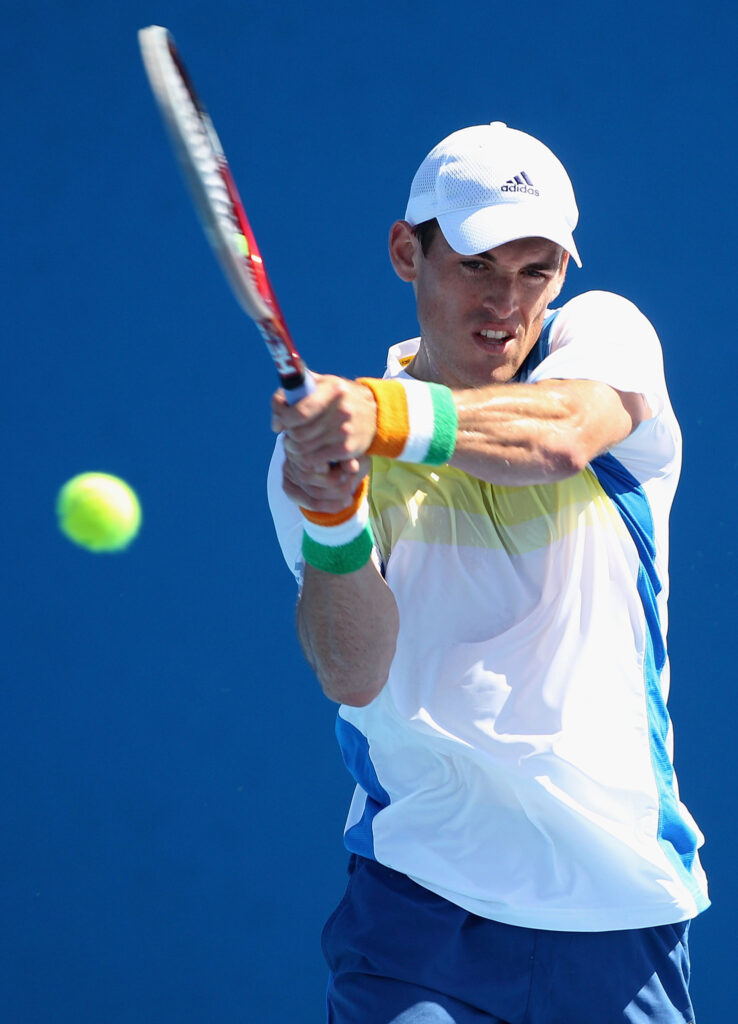MELBOURNE, Australia — James McGee did not last two hours at the 2014 Australian Open, but his brief stay Wednesday morning failed to dampen his mood.
On Court 12 at Melbourne Park, McGee, a 26-year-old from Dublin, lost to Jimmy Wang of Taiwan, 7-6 (2), 7-5, in the first round of the qualifying draw in 1 hour 44 minutes.
“There were sparks of greatness that during the match I felt like, ‘Wow, I’m playing great,’ ” McGee said in the players’ lounge, his mood already brightened an hour after defeat. “But I couldn’t maintain it consistently. Obviously really disappointed to have lost, but at least the good thing is knowing I’m playing at a high level.”
The quick stop in Melbourne was not unusual for McGee, who has competed in 26 countries and territories since the start of the 2012 season, spanning the globe from Canada to Israel to Indonesia to New Caledonia.
His level, by all measures, is higher than it has ever been. He is the highest-ranked player from Ireland, at No. 214, an improvement of 132 spots from a year ago. He is also the only Irishman ranked inside the top 400.
This Australian Open was only the second Grand Slam event in which McGee had earned entry into the qualifying, after Wimbledon last year. But because Wimbledon’s qualifying tournament is played at an auxiliary site, Wednesday was the first time McGee competed on the grounds of a Grand Slam event, a milestone that dawned on him as he did chores earlier in the week.
“I picked up my laundry, and I had a good training session, and I just thought to myself, Jeez, this is my dream,” he said. “This is everything that I absolutely want, you know? There’s no other place in the world that I want to be right now.”
McGee’s appreciation of his spot in Australia is especially understandable after a look at his recent itinerary, whose breadth is not all that unusual for a player in the lowest rungs of the sport. While the top players were competing at the United States Open last summer, McGee, who missed the qualifying cutoff by two places, traveled to Gabon in search of ranking points. He left Gabon with a trophy, but also with two parasites that cost him two months of competition.
Other trips were frontloaded with problems. After spraining his ankle in a 2009 Davis Cup doubles match in Cyprus, McGee flew to Syria alone for a Futures tournament, at the lowest level of professional tennis. McGee made it to Damascus, but his racket bag did not. “I didn’t have any tennis rackets, didn’t have any tennis shoes, and I was hobbling around the airport with a bad ankle,” McGee said.
He blearily took the court hours later, playing with borrowed equipment against a feisty local opponent. “So I’m like half asleep, getting onto the court, thinking to myself, ‘What on earth have I got myself into here?’ ” he said. “You really start asking these sort of deep questions: ‘What am I doing here?’ ‘Why am I putting myself through all this pain for one ATP point?’
“By the first point of the match, we had some guy with a drum on the side of the court: Bam! Bam! Bam! Bam! It’s 35 degrees, 40 degrees — it’s absolutely roasting.” Those temperatures, in Celsius, are the equivalent of 95 to 104 Fahrenheit.
“There was a point in the match where I just stopped and I thought, ‘Is this really worth it?’ ” he said. “I can’t move, I’m using someone else’s rackets, someone else’s shoes, and I’m playing some guy who wants to kill me.”
McGee won the match and later reached the semifinals in what turned out to be one of his more successful weeks that year.
He has made it beyond Futures events and onto the higher tiers of Challenger events and ATP qualifying, but McGee, who has earned $94,673 in career prize money, remains an advocate for change to help lower-ranked players. In June, he wrote an impassioned 3,600-word blog post detailing the financial strain tennis players face at lower levels of the sport, as well as his own coping mechanisms, like doing laundry in hotel bathtubs. He received $3,600 for losing in the first round of Australian Open qualifying, as well as a $1,500 travel stipend from the tournament that is given to all players.
The Irish tennis federation does not give him the type of financial support offered by larger federations, like the United States Tennis Association or Britain’s Lawn Tennis Association.
“Who knows whether it was good or bad?” he said. “See, I find from observations that maybe the English guys don’t have as much hunger as me. I’ve got a huge amount of hunger, which has brought me this far.”
Lacking the prize money or sponsorship to employ a coach, McGee has to travel alone most of the year, which can be difficult for an athlete who ends nearly every week with a loss.
“I’ve had some really rough moments, to be honest, on my own,” McGee said. “Especially after losses. Especially going back to a hotel room after a match you should’ve won, and you had match points, or whatever, and you’re in, of all places, you’re in Romania. I remember that experience in Romania this year. I was on my own, and you really have those soul-searching moments, like, why am I doing this?”
Without built-in support, McGee has worked to keep his emotions afloat with motivational books and even YouTube videos.
“It can be an absolutely amazing lifestyle when you’re winning, and when you’re losing, you have to be really tough,” he said. “You’ve got to be very mentally tough to play this sport, I think. And the desire has to be there, which I have.”

